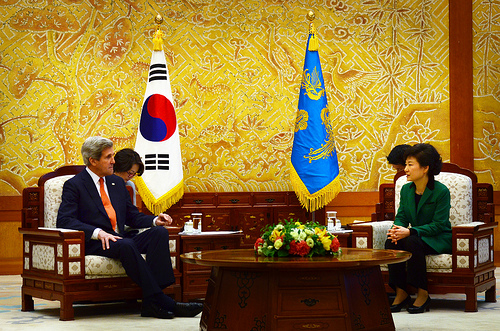
The re-balancing of United States interests in the Far East, the so called “pivot to Asia” that was announced two years ago by the Obama administration, is now stuck in neutral. That is because what the world is witnessing on the Korean Peninsula is good old-fashioned power politics: A move by China to re-balance its own interests in Asia. That is the real take away from the current stand-off with North Korea.
Anyone that believes the tensions created by North Korean president, Kim Jong-un, are copyrighted products of the baby-faced graduate of a Swiss education, couldn’t be more mistaken. While it is true that he is following the path set by his father and grandfather, they too were beholden to China and were emissaries of its national interests, just as Kim Jong-un is today.
While it may also be true that North Korea’s new leader needs to establish his authority with the country’s military and citizens, the real reason for this dangerous standoff is different. It is China asserting its national interests by demonstrating, through North Korea, that while it may not be the equal of the United States in military terms, it has the ability to assert its national interests by other means.
The “Pivot to Asia” was a perfectly understandable exercise by the world’s remaining superpower as it watched the dramatic growth of China. But for the fact that the exercise belonged to a bygone age. Nothing demonstrates this better than the change in Secretary Kerry’s position before and after his meeting with the Chinese leadership in Beijing last week.
On Sunday evening…Kerry appeared to open the door to talking without requiring the North to take de-nuclearization steps in advance. Beijing, he said, could be an intermediary… “If the Chinese came to us and said, ‘look, here’s what we’ve got cooking and so forth,’ I’m not going to tell you that I’m shutting the door today to something that’s logical and that might have a chance of success,” he said.
Was the United States right to display a show of force in and around the Korean Peninsula? Of course it was. It would have been tragic were China and North Korea to misread America’s budgetary problems as a signal that the United States would not live up to its treaty obligations with South Korea and Japan. But the real lesson from this ongoing episode on which the United States has already spent hundreds of millions of dollars is something quite different.
The larger and more strategic lesson for the United States from the current crisis on the Korean peninsula is to recognize how much the rules of the geopolitical power-game have changed in the 21st century. A century in which the world’s 7 billion people are interconnected as never before, a century in which the United States is projected to lose its standing as the largest economy in the world. A century in which the world has begun to absorb the lessons from the failure of the world’s sole super-power to prevail against third rate military powers such as Vietnam, Iraq, Pakistan, and Afghanistan.
I would have gladly traded in my favorite silver chopsticks to listen to the private conversation that Secretary of State John Kerry had with the Chinese leadership. I bet the Chinese side opened with a dialogue that went something like this.
“Mr. Secretary, we are happy to help drill sense into our friends the North Koreans. That is our duty. After all, as you and others in America have often said, the United States and China are destined to be close friends. Now about this “Pivot” and America’s contention that the powers in Asia need a moderator from North America to work out relations among themselves, shall we sit and discuss.”
The Korean crisis vividly demonstrates why the face of American leadership in the 21st century must be different. The idea that America must always lead everywhere in the world is a noble one, but badly in need of recalibration for the realities of the 21st Century. If America feels it must “pivot,” it will have to pivot with others who have a regional stake. It can no longer pivot alone. If you don’t agree, tune in to the remaining acts of the Korean soap opera.
Sarwar Kashmeri is a senior fellow with the Atlantic Council’s Brent Scowcroft Center on International Security. This piece was originally featured in The Huffington Post.
Photo credit: US Department of State
Image: 8641860713_54e500df68.jpg
